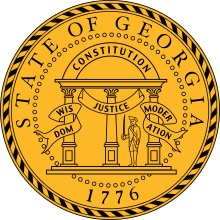The 1988 United States presidential election in Georgia took place on November 8, 1988. All 50 states and the District of Columbia, were part of the 1988 United States presidential election. Georgia voters chose 12 electors to the Electoral College, which selected the President and Vice President.
Georgia was won by incumbent United States Vice President George H. W. Bush of Texas, who was running against Massachusetts Governor Michael Dukakis. Bush ran with Indiana Senator Dan Quayle as Vice President, and Dukakis ran with Texas Senator Lloyd Bentsen.
Georgia weighed in for this election as about 6% more Republican than the national average.
Partisan background
The presidential election of 1988 was a very partisan election for Georgia, with more than 99% of the electorate voting for either the Democratic or Republican parties, and only 4 parties represented on the ballot, statewide.[1] In typical form for the time in Georgia, the Republican party pulled the vast majority of less-populated counties, while areas conglomerate with Atlanta and Savannah, turned out primarily for Dukakis as the Democratic candidate. Also, the 1988 National Convention of the U.S. Democratic Party was held at The Omni, in Atlanta, Georgia.
Republican victory
Bush won the election in Georgia with a 20 point sweep-out landslide. This is one of the first presidential elections where Georgia shares the role of the largest player in the conservative powerhouse of the Deep South with the increasingly important and conservative state of Texas. While Georgia typically votes conservative, the election results in 1988 are also indicative of a nationwide reconsolidation of base for the Republican Party, which took place through the 1980s. Through the passage of some very controversial economic programs, spearheaded by then President Ronald Reagan (called, collectively, "Reaganomics"), the mid-to-late 1980's saw a period of economic growth and stability. The hallmark for Reaganomics was, in part, the wide-scale deregulation of corporate interests, and across the board tax cuts (which critics accused of benefitting the wealthy).[2]
Dukakis ran on a notably socially liberal agenda, and advocated for higher economic regulation and environmental protection. Bush, alternatively, ran on a campaign of continuing the social and economic policies of former President Reagan - which gained him much support with social conservatives and people living in rural areas, who largely associated the Republican Party with the economic growth of the 1980s. Additionally, while the economic programs passed under Reagan, and furthered under Bush and Clinton, may have boosted the economy for a brief period, they are criticized by many analysts as "setting the stage" for economic troubles in the United State after 2007, such as the Great Recession.[3]
Results
See also
References
|
|---|
| | Candidates | | |
|---|
| General
articles | |
|---|
| Local
results | |
|---|
| Other 1988
elections | |
|---|
|





